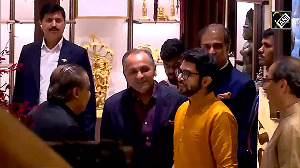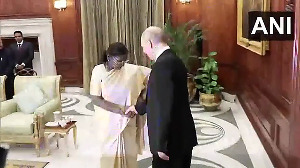'If unity is not going to be based on values and principles, how will we achieve it?'

The meeting of Opposition parties in Patna last month was an opportunity to build bridges. But as events rolled out, it was also an occasion to burn bridges.
From Lalu Prasad advocating the merits of matrimony to Rahul Gandhi thus appointing himself paterfamilias of the larger Opposition family to the lack of traction for Nationalist Congress Party leader Sharad Pawar's suggestion that a common minimum programme (CMP) be one of the first steps in forging unity and Trinamool Congress chief Mamata Banerjee advising Arvind Kejriwal and Rahul to sort out their differences on an Ordinance for Delhi 'over tea and biscuits' instead of wasting collective time, the visible optics of the meeting were as interesting as the behind-the-scenes details.
The order in which people were called to speak was simple: It was clockwise.
As Nitish Kumar and Lalu were sitting in the middle, those seated to the right of Nitish spoke first.
Mallikarjun Kharge delivered his speech first, and Rahul followed. Then Mamata was invited.
She gave a long speech about the stamping out of state autonomy through the office of Governors, misuse of central agencies, and the central government's 'communal' agenda.
Several other speakers came in between, and the sequence broke as Omar Abdullah of the National Conference was allowed to speak first as he had to catch a flight.
It so happened that Sitaram Yechury, secretary general of the Communist Party of India-Marxist, was asked to give his speech almost towards the end.
It was enough that Yechury and Mamata, whose parties are bitter rivals in West Bengal, sat together at the same table.
But as Yechury began speaking, Mamata got up, fussed with her papers, announced she was getting late for her flight, shook hands with the hosts, and left.
"The lack of expression on Yechury's face illustrated his fury. He sat through a rival's address, sinking political differences in the interest of Opposition unity. She left before he could get a chance to speak, as if she was totally uninterested in what he had to say," said a witness.
Equally interesting was each leader's perception of what the basis of Opposition unity should be.
Pawar called for the drawing up of a CMP, and M K Stalin (Dravida Munnetra Kazhagam) exhorted the gathering to draw up a common programme for unity.
But the Opposition's coming-together principle was couched in the broadest possible terms: Issues relating to the curtailment of the federal rights of states, the use of food security as a political tool against Opposition-ruled states, the misuse of statutory investigative bodies, and the need to set up one common Opposition candidate against one Bharatiya Janata Party candidate in the Lok Sabha elections to prevent the division of votes.
Specifics were avoided.
Congress sources said the way forward for unity was a 'common agenda' -- a CMP could come later.
Throughout the meeting, those present said Rahul's mien was that of a listener.
He let party president Kharge address the issue flagged by Kejriwal: That before anything else could happen, the Congress had to announce its stand on the Ordinance on the Delhi government's powers.

They will meet again in Bengaluru on July 17-18. Photograph: ANI Photo
After the Supreme Court's order on the division of power between the Centre and the Delhi government, giving the balance of advantage to the elected government, the Centre has enforced an Ordinance, ensuring Delhi stays under its control.
Kejriwal's implied complaint that the Congress was not backing Aam Aadmi Party on the issue, effectively putting itself in the BJP's corner, was not dealt with by Rahul but by Kharge.
Rahul, in his speech, said, 'I have no memory. I don't remember who my enemy is and who my rival is. I come here with a neutral mind. We are all together.'
Veterans of Opposition unity moves say the meeting stands out for the simple fact that it met the challenge of bringing so many disparate groups together at one table.
Said Tejashwi Yadav a day later: 'The meeting saw the coming together of leaders from Kashmir to Kanyakumari with the sole purpose of defeating fascist forces. The next Lok Sabha elections are not going to be about Narendra Modi or any other individual but about the people.'
However, there are doubts.
Said a Congress MP: "What is going to underpin an alternative vision after 10 years of Modi rule? When you consider that the chief of the Congress' state unit in Kerala, which is ruled by a Left Front government, was arrested by the state government on the day the Opposition was supposedly meeting to discuss unity, you wonder where unity is going to come from."
"If unity is not going to be based on values and principles, how will we achieve it?"
Feature Presentation: Aslam Hunani/Rediff.com











